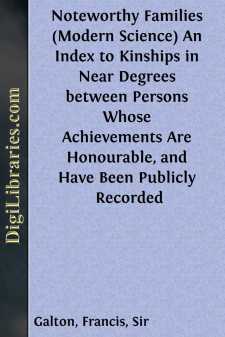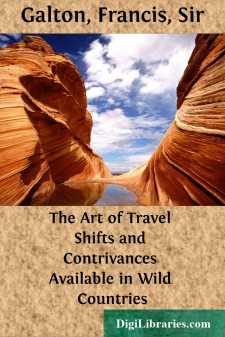Categories
- Antiques & Collectibles 13
- Architecture 36
- Art 48
- Bibles 22
- Biography & Autobiography 813
- Body, Mind & Spirit 142
- Business & Economics 28
- Children's Books 17
- Children's Fiction 14
- Computers 4
- Cooking 94
- Crafts & Hobbies 4
- Drama 346
- Education 46
- Family & Relationships 57
- Fiction 11829
- Games 19
- Gardening 17
- Health & Fitness 34
- History 1377
- House & Home 1
- Humor 147
- Juvenile Fiction 1873
- Juvenile Nonfiction 202
- Language Arts & Disciplines 88
- Law 16
- Literary Collections 686
- Literary Criticism 179
- Mathematics 13
- Medical 41
- Music 40
- Nature 179
- Non-Classifiable 1768
- Performing Arts 7
- Periodicals 1453
- Philosophy 64
- Photography 2
- Poetry 896
- Political Science 203
- Psychology 42
- Reference 154
- Religion 513
- Science 126
- Self-Help 84
- Social Science 81
- Sports & Recreation 34
- Study Aids 3
- Technology & Engineering 59
- Transportation 23
- Travel 463
- True Crime 29
Noteworthy Families (Modern Science) An Index to Kinships in Near Degrees between Persons Whose Achievements Are Honourable, and Have Been Publicly Recorded
by: Francis Galton
Description:
Excerpt
Chapter I.—General Remarks.
This volume is the first instalment of a work that admits of wide extension. Its object is to serve as an index to the achievements of those families which, having been exceptionally productive of noteworthy persons, seem especially suitable for biographical investigation.
The facts that are given here are avowedly bald and imperfect; nevertheless, they lead to certain important conclusions. They show, for example, that a considerable proportion of the noteworthy members in a population spring from comparatively few families.
The material upon which this book is based is mainly derived from the answers made to a circular sent to all the Fellows of the Royal Society whose names appear in its Year Book for 1904.
The questions were not unreasonably numerous, nor were they inquisitorial; nevertheless, it proved that not one-half of those who were addressed cared to answer them. It was, of course, desirable to know a great deal more than could have been asked for or published with propriety, such as the proneness of particular families to grave constitutional disease. Indeed, the secret history of a family is quite as important in its eugenic aspect as its public history; but one cannot expect persons to freely unlock their dark closets and drag forth family skeletons into the light of day. It was necessary in such a work as this to submit to considerable limitations, while turning to the fullest account whatever could be stated openly without giving the smallest offence to any of the persons concerned.
One limitation against which I still chafe in vain is the impracticability of ascertaining so apparently simple a matter as the number of kinsfolk of each person in each specific degree of near kinship, without troublesome solicitations. It was specially asked for in the circular, but by no means generally answered, even by those who replied freely to other questions. The reason must in some cases have been mere oversight or pure inertia, but to a large extent it was due to ignorance, for I was astonished to find many to whom the number of even their near kinsfolk was avowedly unknown. Emigration, foreign service, feuds between near connections, differences of social position, faintness of family interest, each produced their several effects, with the result, as I have reason to believe, that hardly one-half of the persons addressed were able, without first making inquiry of others, to reckon the number of their uncles, adult nephews, and first cousins. The isolation of some few from even their nearest relatives was occasionally so complete that the number of their brothers was unknown. It will be seen that this deficiency of information admits of being supplied indirectly, to a considerable degree.
The collection of even the comparatively small amount of material now in hand proved much more troublesome than was anticipated, but as the object and limitations of inquiries like this become generally understood, and as experience accumulates, the difficulty of similar work in the future will presumably lessen.
The Fellowship of the Royal Society is a distinction highly appreciated by all members of the scientific world. Fifteen men are annually selected by its council out of some sixty candidates, each candidate being proposed by six, and usually by more, Fellows in a certificate containing his qualifications. The candidates themselves are representatives of a multitude of persons to whom the title would be not only an honour but a material advantage. The addition of the letters “F.R.S.” to the names of applicants to any post, however remotely connected with science, is a valuable testimonial and a recognised aid towards success, so the number of those who desire it is very large. Experience shows that no special education, other than self-instruction, is really required to attain this honour. Access to laboratories, good tuition, and so forth, are doubtless helpful, so far that many have obtained the distinction through such aid who could not otherwise have done so, but they are far from being all-important factors of success....



